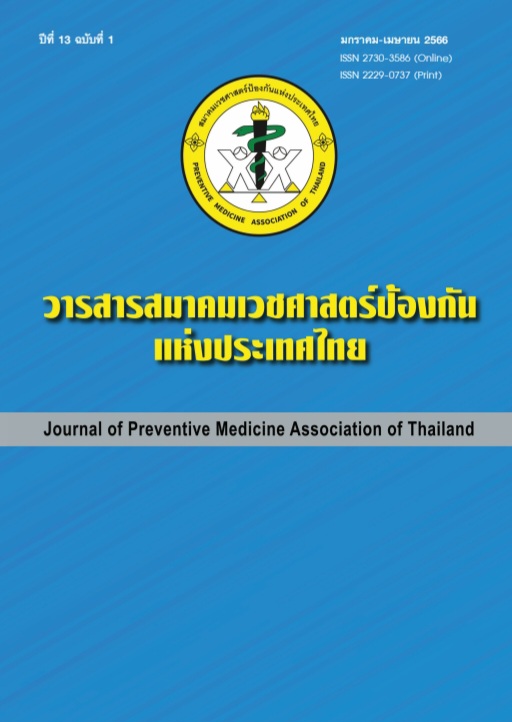Perception and Attitude toward COVID-19 Vaccination among Population in Bangkok Metropolitan: A Cross-Sectional Study
Keywords:
perception, attitude, COVID-19 vaccinationAbstract
Objective: There is a need to accelerate COVID-19 vaccine development to deal with the COVID-19. However, the quick vaccine development engendered untrust on COVID-19 vaccine. Thus, it is important to study the levels and factors associated to perception and attitude toward COVID-19 vaccination among population in Bangkok Metropolitan. Methods: Descriptive cross-sectional study consisted of 312 residents in Bangkok Metropolitan. Convenience sampling was determined for collection data by questionnaires including, baseline characteristics, health and illness data, vaccination, COVID-19 and vaccination perception, and attitude toward COVID-19 vaccination. Data were analyzed statistical with the Chi-square test and Multivariate analysis with multiple logistic regression. Results: The respondents had a high level of perceived susceptibility and perceived severity of COVID-19 disease were 68.9% and 85.9%, respectively. The high level of perceived benefits and perceived barriers of COVID-19 vaccination were 48.7% and 49.7, respectively. The positive attitude toward COVID-19 vaccination was 53.2%. Factors were associated to perception of COVID-19 disease and vaccination with statistic significant at the 0.05 level include; gender, vaccination, COVID-19 infection in family or friends, education level, number of sources, and regular medication. Factor were associated to attitude toward COVID-19 vaccination with statistic significant at the 0.05 level include; vaccination, and education level. The attitude toward COVID-19 vaccination was positively significantly correlated with perceived susceptibility, perceived severity, and perceived benefits, and negatively significantly correlated with perceived barriers at the 0.05 level. Conclusion: The relevant agencies should create stimulus and motive about the COVID-19 disease and vaccine, as well as minimizing the barriers to receiving vaccination to create positive attitude toward COVID-19 vaccination effects to receiving vaccination.
References
คณะแพทย์โรงพยาบาลรามาธิบดี. ความรู้พื้นฐาน COVID-19 ตอนที่ 1. กรุงเทพฯ: คณะแพทย์โรงพยาบาลรามาธิบดี มหาวิทยาลัยมหิดล; 2563.
กรมควบคุมโรค กระทรวงสาธารณสุข. แนวทางการให้วัคซีนโควิด-19 ในสถานการณ์การระบาดปี 64 ของประเทศไทย. นนทบุรี: กรมควบคุมโรค กระทรวงสาธารณสุข; 2564.
โรงพยาบาลมะเร็งอุดรธานี. ความรู้เรื่องวัคซีนป้องกันโรคโควิด 19 สำหรับอาสาสมัครสาธารณสุขประจำหมู่บ้าน [อินเทอร์เน็ต]. 2564 [เข้าถึงเมื่อ 16 ก.ค. 2564]. เข้าถึงได้จาก: https://www.udch.go.th/uploads/doc/News/2564/220220210454454914_information.pdf.
สำนักงานกองทุนสนับสนุนการสร้างเสริมสุขภาพ. คู่มือวัคซีนสู้โควิด ฉบับประชาชน. กรุงเทพฯ: สำนักงานกองทุนสนับสนุนการสร้างเสริมสุขภาพ; 2564.
Islam MS, Siddique AB, Akter R, Tasnim R, Sujan SH, Ward PR, et al. Knowledge, attitudes and perceptions towards COVID-19 vaccinations: a cross-sectional community survey in Bangladesh. medRxive. BMC Public Health 2021;1851.
Cordina M, Lauri MA, Lauri J. Attitudes towards COVID-19 vaccination, vaccine hesitancy and intention to take the vaccine. Pharm Pract (Granada) 2021;19(1):2317.
Fares S, Elmnyer MM, Mohamed SS, Elsayed R. COVID-19 vaccination perception and attitude among healthcare workers in Egypt. J Prim Care Community Health 2021;12:1-9.
Paudel S, Palaian S, Shankar PR, Subedi N. Risk perception and hesitancy toward COVID-19 vaccination among healthcare worker and staff at a medical college in Nepal. Risk Manag Healthc Policy 2021;14:2253–61.
Spinewine A, Petein C, Evrard P, Vastrade C, Laurent C, Delaere B, et al. Attitudes towards COVID-19 vaccination among hospital staff - understanding what matters to hesitant people. Vaccines (Basel) 2021;9(5):469.
หมอพร้อม. ความครอบคลุมการได้รับวัคซีนโควิด-19 [อินเทอร์เน็ต]. 2565 [เข้าถึงเมื่อ 4 พ.ย. 2564]. เข้าถึงได้จาก: https://cvp1.moph.go.th/accountcenter
Becker MH, Drachman RH, Kirscht JP. A new approach to explaining sick-role behavior in low-income population. Am J Public Health 1974;64(3):205-16.
Wayne WD. Biostatistics: a foundation of analysis in the health science. 6th ed. New York: John Wiley&Sons, Inc.; 1995.
Elhadi M, Alsoufi A, Alhadi A, Hmeida A, Alshareea E, Dokali M, et al. Knowledge, attitude, and acceptance of healthcare workers and the public regarding the COVID-19 vaccine: a cross- sectional study. BMC Public Health 2021;21:955.
Best JW. Research in education. 3rd ed. Englewood Cliffs, New Jersey: Prentice Hall; 1977.
ณัฎฐวรรณ คำแสน. ความรู้ ทัศนคติ และพฤติกรรมในการป้องกันตนเองจากการติดเชื้อไวรัสโควิด-19ของประชาชนในเขตอำเภออู่ทอง จังหวัดสุพรรณบุรี. วารสารวิทยาลัยพยาบาลพระจอมเกล้า 2564;4:33-48.
นงศ์ณพัชร์ มณีอินทร์, อิทธิพล ดวงจินดา. การรับรู้ความสามารถในการดูแลตนเองกับพฤติกรรมการป้องกันโรคติดเชื้อไวรัสโคโรนา 2019 ของผู้สูงอายุ อำเภออู่ทอง จังหวัดสุพรรณบุรี. วารสารสภาการสาธารณสุขชุมชน 2564;3:1-18.
ชุติมา บุญทวี. ปัจจัยที่ส่งผลต่อการตัดสินใจฉีดวัคซีนป้องกันโคโรนาไวรัส (COVID-19) เข็มกระตุ้นของบุคลากรกลุ่มงานพยาบาลโรงพยาบาลตำรวจ. วารสารวิจัยเพื่อการส่งเสริมสุขภาพและคุณภาพชีวิต 2565;2:49-60.
นิด้าโพล. การจัดสรรวัคซีนป้องกัน COVID-19 [อินเทอร์เน็ต]. 2565 [เข้าถึงเมื่อ 3 พ.ย.2565]. เข้าถึงได้จาก: https://nidapoll.nida.ac.th/survey_detail?survey_id=505
ราชันย์ โพธารินทร์, รสสุคนธ์ ฉิมพินิจ, สุกัลยา คำกอดแก้ว, สุนันทวดี มีวงค์, สุพัตรา มะลิติไข, ปาหนัน กนกวงศ์นุวัฒน์. ทัศนคติต่อโรคโควิด 19 และการฉีดวัคซีนป้องกันโควิด 19 ของนักศึกษาคณะพยาบาลศาสตร์ มหาวิทยาลัยราชภัฏรำไพพรรณี. การประชุมวิชาการระดับชาติ ครั้งที่ 14; 7-8 กรกฎาคม 2565; มหาวิทยาลัยราชภัฏนครปฐม. นครปฐม: มหาวิทยาลัยราชภัฏนครปฐม; 2565.
บวรลักษณ์ ขจรฤทธิ์, บุฎกา ปัณฑุรอัมพร. ปัจจัยที่ส่งผลต่อการตัดสินใจฉีดวัคซีนป้องกันโควิด-19 ของประชากรในจังหวัดสมุทรปราการ [อินเทอร์เน็ต]. 2565 [เข้าถึงเมื่อ 3 พ.ย.2565]. เข้าถึงได้จาก: https://mmm.ru.ac.th/MMM/IS/sun18/6214070058.pdf
Asres F, Umeta B. COVID-19 vaccines: awareness, attitude and acceptance among undergraduate university students. J Pharm Policy Pract 2022;15(1):32.
Chakraverty D, Baumeister A, Aldin A, Seven US, Monsef I, Skoetz N, et al. Gender differences of health literacy in persons with a migration background: a systematic review and meta-analysis. BMJ 2022;12(7):e056090.
Lee HY, Lee J, Kim KN. Gender differences in health literacy among Korean adults: Do women have a higher level of health literacy than men? Am J Mens health 2015;9(5):370-9.
Garcia LY, Cerda AA. Acceptance of a COVID-19 vaccine: a multifactorial consideration. Vaccine 2020;38(48):7587.
Abay ES, Belew MD, Ketsela BS, Mengistu EE, Getachew LS, Teferi YA, et al. Assessment of attitude towards COVID-19 vaccine and associated factors among clinical practitioners in Ethiopia: a cross-sectional study. PLoS One 2022;17(6):e0269923.
Zhong BL, Luo W, Li HM, Zhang QQ, Liu XG, Li WT, et al. Knowledge, attitudes, and practices towards COVID-19 among Chinese residents during the rapid rise period of the COVID-19 outbreak: a quick online cross-sectional survey. Int J Biol Sci 2020;16(10):1745-52.
Downloads
Published
How to Cite
Issue
Section
License
Copyright (c) 2023 Journal of Preventive Medicine Association of Thailand

This work is licensed under a Creative Commons Attribution-NonCommercial-NoDerivatives 4.0 International License.
บทความที่ลงพิมพ์ในวารสารเวชศาสตร์ป้องกันแห่งประเทศไทย ถือเป็นผลงานวิชาการ งานวิจัย วิเคราะห์ วิจารณ์ เป็นความเห็นส่วนตัวของผู้นิพนธ์ กองบรรณาธิการไม่จำเป็นต้องเห็นด้วยเสมอไปและผู้นิพนธ์จะต้องรับผิดชอบต่อบทความของตนเอง






